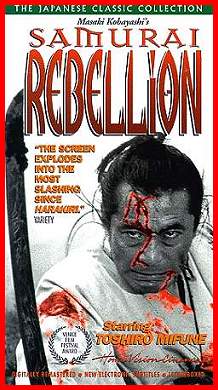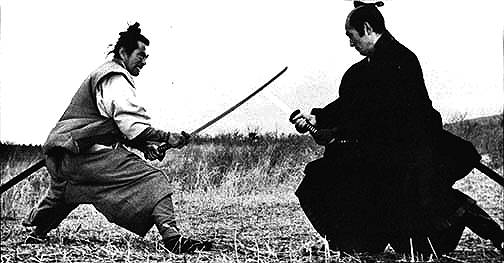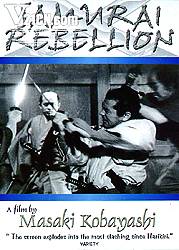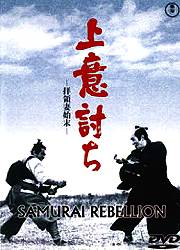|
|
| Sei in: Cinema e Medioevo « Indice alfabetico dei film |
L'ULTIMO SAMURAI
(J˘i-uchi: Hairy˘ tsuma shimatsu)
1967, regia di Masaki Kobayashi

Scheda: Nazione: Giappone - Produzione: Mifune Productions Ltd., Toho Company Ltd. - Distribuzione: Regionale, Toho Company Ltd., Toho International Company Inc. - Soggetto: dal romanzo Hairyozuma Shimatsu di Yasuhiko Takiguchi - Sceneggiatura: Shinobu Hashimoto - Fotografia: Kazuo Yamada - Montaggio: Hisashi Sagara - Scenografia: Yoshir˘ Muraki - Musiche: T˘ru Takemitsu - Formato: Tohoscope, B.N. - Durata: 128' (95').
Cast: Toshir˘ Mifune, Y˘ko Tsukasa, Tatsuya Nakadai, Tatsuyoshi Ehara, Michiko Otsuka, Etsuko Ichihara, Takeshi Kato, Shigeru K˘yama, Tatsuo Matsumura, Masao Mishima, Isao Yamagata.



![]() Trama e commenti:
mymovies.it:
źNel 1725 il samurai Isaburo Sosabara (T. Mifune) che ha dedicato la vita al
servizio dello shogun Matsudaira, apprende che suo figlio Yogoro deve sposare
Ichi, concubina dello shogun cui aveva dato un figlio. Quando Matsudaira perde
il suo unico erede legittimo, ordina a Yogoro di restituirgli moglie e bambino.
Suo padre Isaburo si ribella, ma la giustizia non trionfa. Scritto da Shinobu
Hashimoto (Harakiri), da un romanzo di Yasuhiko Takiguchi, Ŕ un film molto
parlato in lente e geometriche cadenze, non lontane da quelle di una tragedia di
Racine, in cui i personaggi tengono sotto controllo le passioni sino al punto di
ebollizione. Bruscamente si passa a un'ultima mezz'ora di stilizzato cinema
d'azione con duelli di squisita eleganza figurativa...╗.
Trama e commenti:
mymovies.it:
źNel 1725 il samurai Isaburo Sosabara (T. Mifune) che ha dedicato la vita al
servizio dello shogun Matsudaira, apprende che suo figlio Yogoro deve sposare
Ichi, concubina dello shogun cui aveva dato un figlio. Quando Matsudaira perde
il suo unico erede legittimo, ordina a Yogoro di restituirgli moglie e bambino.
Suo padre Isaburo si ribella, ma la giustizia non trionfa. Scritto da Shinobu
Hashimoto (Harakiri), da un romanzo di Yasuhiko Takiguchi, Ŕ un film molto
parlato in lente e geometriche cadenze, non lontane da quelle di una tragedia di
Racine, in cui i personaggi tengono sotto controllo le passioni sino al punto di
ebollizione. Bruscamente si passa a un'ultima mezz'ora di stilizzato cinema
d'azione con duelli di squisita eleganza figurativa...╗.
![]() Plot Summary, Synopsis, Review:
IMDb
-
tvguide.com -
filmref.com:
źIn a time of sustained peace, the powerful daimyo (feudal warlords) have
become resigned to an existence of pointless exercises and petty bureaucracy in
a determined effort to retain privilege and curry favors from Edo. In an attempt
to stave off boredom, Lord Matsudaira's (Tatsuo Matsumura) seasoned swordsman,
Isaburo Sasahara (Toshir˘ Mifune) and his trusted colleague Tatewaki Asano (Tatsuya
Nakadai), have been relegated to the task of evaluating swords by felling straw
dummies for a report to the chamberlain and reviewing uneventful border records
for the daimyo. On the afternoon preceding the Suwa Shrine Festival, steward
Takahashi (Shigeru K˘yama) pays a visit to the Sasahara residence in order to
propose - or more appropriately, coerce - an arranged marriage between Lord
Matsudaira's disfavored mistress, Lady Ichi (Y˘ko Tsukasa), and Isaburo's oldest
son, Yogoro (Takeshi Kato). Having given birth to Lord Matsudaira's younger son,
but reported to have physically attacked the daimyo in open court, the
controversial Lady Ichi seems an unsuitable match for the reticent and
unassuming Yogoro. However, to refuse Lord Matsudaira's request would be deemed
an act of defiance and threatens to sully the family name. Impulsively, Yogoro
accepts the disagreeable proposition on behalf of his reluctant father, a
decision that proves to be an unexpected blessing as the young couple settle
into a life of mutual affection and respect. But soon, fortune would turn
against the Sasahara family, as Lord Matsudaira demands Ichi's return, and
Isaburo is forced to choose between allegiance to his master and devotion to his
beloved daughter-in-law...╗.
Plot Summary, Synopsis, Review:
IMDb
-
tvguide.com -
filmref.com:
źIn a time of sustained peace, the powerful daimyo (feudal warlords) have
become resigned to an existence of pointless exercises and petty bureaucracy in
a determined effort to retain privilege and curry favors from Edo. In an attempt
to stave off boredom, Lord Matsudaira's (Tatsuo Matsumura) seasoned swordsman,
Isaburo Sasahara (Toshir˘ Mifune) and his trusted colleague Tatewaki Asano (Tatsuya
Nakadai), have been relegated to the task of evaluating swords by felling straw
dummies for a report to the chamberlain and reviewing uneventful border records
for the daimyo. On the afternoon preceding the Suwa Shrine Festival, steward
Takahashi (Shigeru K˘yama) pays a visit to the Sasahara residence in order to
propose - or more appropriately, coerce - an arranged marriage between Lord
Matsudaira's disfavored mistress, Lady Ichi (Y˘ko Tsukasa), and Isaburo's oldest
son, Yogoro (Takeshi Kato). Having given birth to Lord Matsudaira's younger son,
but reported to have physically attacked the daimyo in open court, the
controversial Lady Ichi seems an unsuitable match for the reticent and
unassuming Yogoro. However, to refuse Lord Matsudaira's request would be deemed
an act of defiance and threatens to sully the family name. Impulsively, Yogoro
accepts the disagreeable proposition on behalf of his reluctant father, a
decision that proves to be an unexpected blessing as the young couple settle
into a life of mutual affection and respect. But soon, fortune would turn
against the Sasahara family, as Lord Matsudaira demands Ichi's return, and
Isaburo is forced to choose between allegiance to his master and devotion to his
beloved daughter-in-law...╗.
![]() Approfondimenti: Movie
Review
Approfondimenti: Movie
Review
Conosciuto anche con i titoli: Joţ-uchi; Rebellion; Samurai Rebellion.